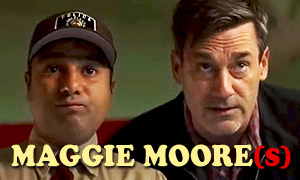The Farewell: History vs. Hollywood
| REEL FACE: | REAL FACE: |
Awkwafina
Born: June 2, 1988 Birthplace: New York City, New York, USA | Lulu Wang
Birthplace: Beijing, China Renamed Billi in the movie |
Zhao Shuzhen
| Nai Nai
Birthplace: China Lulu's grandmother |
Diana Lin
| Jian Wang
Birthplace: China Lulu's mother |
Tzi Ma
Born: June 10, 1962 Birthplace: Hong Kong, China | Haiyan Wang
Birthplace: China Lulu's father |
Hong Lu (aka Little Nai Nai)
Birthplace: China | Hong Lu (aka Little Nai Nai)
Birthplace: China Lulu's great aunt. She portrays herself in the movie. |
Who is the character Billi based on?
The Farewell true story reveals that Awkwafina's character in the movie, Billi, is based on writer/director Lulu Wang herself. Wang's own "Nai Nai," or grandmother in Chinese, was diagnosed with cancer and her family decided to keep the diagnosis from her. Wang first told the story on an April 2016 episode of This American Life, which piqued the interest of various producers, allowing her to make the movie.
When was Lulu Wang's grandmother diagnosed with cancer?
Lulu Wang's Nai Nai was diagnosed with stage 4 lung cancer in 2013. Rather than revealing the news directly to Wang's 80-year-old grandmother, doctors instead told her grandmother's sister (Wang's Great-Aunt Hong Lu) the news, who passed it along to the family. The family got a second opinion, and then a third. All revealed the same prognosis.
Who told Lulu Wang that her grandmother was dying?
Wang's mother told her over the phone, not in person like in the movie. During the conversation, her mother told her that she would not be permitted to tell her grandma the truth, no matter how much she thought it was the right thing to do. -This American Life
How much time did doctors predict Lulu Wang's grandmother had left?
All of the doctors predicted that Lulu Wang's Nai Nai had three months left to live after the stage 4 lung cancer diagnosis in 2013. However, the true story behind The Farewell revealed that Lulu Wang's grandma was still alive when the movie was released in 2019. "Six years after her diagnosis, Nai Nai is still with us," reads a caption at the end of the movie. Is this evidence that there's some truth to the line in the film, "People don’t die of the cancer, they die of the fear"? -NPR
Is it legal in China to not tell a family member that they are dying?
Yes. As stated in the movie, Chinese law allows keeping a prognosis from a family member, something that is both unheard of and illegal in the United States. As stated in the film, it is believed in the East that a person's life is part of a whole (the family), instead of solely belonging to oneself. It's true that doctors often break bad news to members of the family instead of the patients themselves. "Most families in China would choose not to tell her," explains a doctor in the film. The Chinese also believe that mental and emotional health are directly linked to physical health.
While it can be argued that not telling a family member may give them more worry-free days to enjoy what remains of their life and allow them to die happier, it also has had negative impacts. As a result of withholding diagnoses, family members aren't in control of how they spend their remaining days, and Chinese people are less capable of dealing with death and talking about an illness. In fact, death is considered one of the most taboo topics in Chinese culture.
Simply bringing up mortality is believed to beget bad luck, possibly bringing oneself closer to their own end. People will even pay more for cell phone numbers without the number '4', since it has a similar sound to the Mandarin word for death. Registering as an organ donor is also uncommon, as is writing a will. It is believed that doing so may curse oneself. -Sixth Tone
Did Lulu Wang struggle with her family's decision not to tell her grandmother that she was dying?
Yes. "I very much felt the way that Billi in the movie feels, which is that it's wrong to lie," Wang told People magazine. Wang, who was born in Beijing but emigrated to the United States with her parents when she was six, says that she had never heard of withholding a prognosis from a family member.
In real life, who ultimately made the decision not to tell the grandma she was dying?
Director Lulu Wang, whose own experience inspired the film, says that like in the movie, it was her great-aunt (her grandmother's sister) who ultimately made the decision to withhold the diagnosis. The Farewell true story confirms that both her father and her uncle, who were the surviving men of the family, supported the decision. Her father, who had lived for long periods of time in both the United States and China, was conflicted at first but in the end chose to respect Chinese tradition.
"Nai Nai's sister has been taking care of her, they've been very close since they were kids, and they live in the same apartment building, so it was ultimately her decision," says Wang. As seen in the film, Nai Nai's sister was the one who received the cancer diagnosis from the doctor. She believed that Nai Nai would become overwhelmed with fear and depression if she knew. She'd stop eating, have trouble sleeping, and ultimately lose interest in life. Therefore, she decided it was best not to tell her.
Making the film more authentic is the fact that Wang was able to cast her own Great-Aunt Hong Lu as Billi's great-aunt in the movie. -People
Is Lulu Wang's movie The Farewell based on her This American Life podcast episode?
Yes. Prior to making the movie, writer/director Lulu Wang told the story of her family's little white lie in an April 2016 episode of the This American Life podcast. Her segment was titled "What You Don't Know" and aired as part of the episode "In Defense of Ignorance". Her story was heard by producers, who afterward wanted to help her turn it into a film.
Did they really stage a wedding so that the whole family could see the grandmother?
This is sort of true. In real life, Lulu Wang's cousin had recently married a Japanese woman. They were planning a celebration in China the next year, but it was decided the celebration would instead be in two weeks to ensure that Nai Nai was still alive. "This was our plan," says Lulu Wang, "a giant goodbye party disguised as a giant wedding banquet." Like in the movie, Lulu Wang, her parents, uncle and cousin went to China for the main purpose of visiting her grandma. Family members who had not all been in the same place for 25 years would be together again. -This American Life
Did Lulu Wang's grandmother get shot while she was in the Chinese Army?
No. Lulu Wang's Nai Nai did join the Chinese Army at age 14 to escape an arranged marriage. She fought on the side of the Communist Party against the Nationalists during the Chinese Revolution. Nai Nai does have a limp in real life, but it wasn't from being shot, which Lulu admits is fiction. Instead, it was from marching across China when she was in the army. -NPR
Are the film's locations accurate?
Yes. While researching The Farewell true story, we learned that writer/director Lulu Wang shot on location in her grandmother's neighborhood in her family's hometown of Changchun, China. She also shot the film largely in Mandarin Chinese. "[The studios] wanted it all in English, or as a very broad comedy," she told the Seattle Times. "I thought, if I can’t make it the way I want to make it, I don’t want to make it at all."
How accurate is the character Billi to Lulu Wang herself?
Writer/Director Lulu Wang says that the character Billi (played by Crazy Rich Asians' Awkwafina) is only semi-autobiographical. Like Wang herself had been, Billi is a struggling artist living in New York. While shopping around the idea for the movie, Wang says that a lot of companies wanted her to make the Billi character the bride, in addition to other changes that would make it less true to her own story. She resisted. "I just didn't want to make any compromises on this particular story," she said, emphasizing that her goal was to make the film as authentic as it could be. -People
Did Lulu Wang's grandmother discover the family's secret after The Farewell was released?
No, at least not according to Wang, who says that she told her grandmother that the film was about their family, emigrating to America, and returning for a reunion in the form of a wedding. "We couldn't tell her what the movie was about!" Wang explained to Rolling Stone. "She knew it was about the family — that was obvious. Then she'd ask, 'But what about the family, what's the story?!' And we'd go, 'Oh, you know, us leaving for America, and coming back, and there's a wedding, and culture clashes!' 'Oh, OK.' All technically true. There's just one tiny bit of information she's not getting…."
Lulu Wang's Nai Nai is still alive and even came to bless the set on the first day of shooting, but she never learned the truth. The veteran Chinese actress who portrays her in the movie, Zhao Shuzhen, came to her home to meet her as research for the role, making sure to maintain the lie as they talked. Wang's grandma's sister tries to make sure her grandma, who is mostly confined to her home nowadays, doesn't read reviews or find out too much about the movie. Wang says that her family kept putting off dealing with her grandmother learning about the true story behind The Farewell. They figured she might not be alive by the time it came out.
Wang is not sure how often her grandmother uses Baudu, the Chinese Google. Even if she did try to search for the movie online, Wang doesn't think she knows the title. At least she hopes she doesn't because the Chinese title is Don't Tell Her, which mostly gives away the secret. -NPR
Is it possible that Lulu Wang's grandmother knew she was sick?
Yes. It's something that Wang wonders. After all, her grandmother had lied to her grandfather when he was diagnosed with liver cancer when Wang was 10-years-old. Her grandmother finally told him the truth in the hospital three days before he died. However, Wang's father believes that he knew he was dying.
In addition, Wang's grandmother had been diagnosed with breast cancer in 2007, six years prior to the lung cancer diagnosis. She had a mastectomy. She kept it a secret from most of the family and wore a prosthetic breast. She didn't want them to worry. It certainly makes sense that she would have suspected the family was in turn now lying to her. -This American Life
In hindsight, does Lulu Wang believe that it was the right decision to keep the diagnosis from her grandmother?
"It's hard to say," says Wang, "because I know other people who've made similar decisions and they have a lot of regret or they still feel like the person deserved to know" (People). Wang says that one plus is that the lie gave birth to the film, which was shot in her family's hometown of Changchun. Filming there allowed her to spend a lot more time with her grandmother (NPR).
The Farewell Interviews & Related Videos
Journey deeper into the true story behind The Farewell by watching an interview with writer/director Lulu Wang, whose family's story provided the basis for the movie.
Link-to-Learn More:







